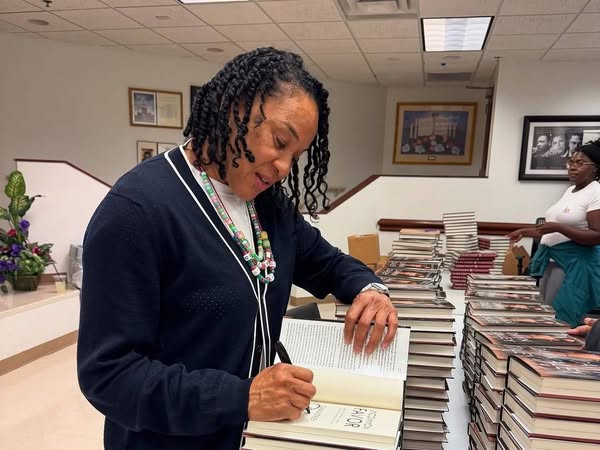Dawn Staley’s name has long been etched into the history books of women’s basketball. A fierce competitor on the court, a masterful coach on the sideline, and an unrelenting advocate for equity, justice, and community beyond the hardwood, Staley’s influence stretches far beyond wins, trophies, and accolades. But what sets her apart isn’t just her resume—it’s the overwhelming love, admiration, and respect she inspires in those around her. She is a pillar of strength to her players, a beacon of hope for young girls across the country, and a role model for coaches, leaders, and dreamers everywhere. As her legacy continues to grow, so too does the chorus of voices that celebrate her—not just for what she’s done, but for who she is.
There’s something magnetic about Dawn Staley. Maybe it’s her authenticity—how she speaks the truth, even when it’s uncomfortable. Maybe it’s her unshakeable loyalty to the people and places that made her. Or maybe it’s her ability to see and bring out the best in others. Whatever it is, those who have come into her orbit are quick to describe the experience as transformative. Former players, colleagues, friends, family members, and fans all speak of her not just as a coach or icon, but as a source of light in their lives.
“She sees you,” says A’ja Wilson, one of Staley’s most iconic protégés and a WNBA superstar in her own right. “She saw me before I saw myself. And she made me believe I could become more than just a great player—she made me believe I could be a great woman, a great leader, and a voice for change.” Wilson often credits Staley for instilling a deep sense of purpose in her—not just to win games, but to uplift her community and stand tall in her truth. The two remain close, sharing a bond forged in hard work, mutual respect, and unwavering love.
Staley’s impact on her players is hard to quantify, but easy to feel. She’s not a coach who simply molds athletes; she raises women. Her practices are rigorous, her expectations high, but her love is unconditional. She believes in tough love—but only because she knows that strength without compassion is hollow. Her players describe her as someone who holds them accountable, but never abandons them in their moments of struggle. Whether they go on to professional stardom or retire from the game, Staley remains a presence in their lives, always a call or text away.
“Dawn’s not just my coach,” says Zia Cooke, a recent graduate of the South Carolina program. “She’s like family. She taught me that being vulnerable is part of being strong. She pushed me when I needed it, but she also held me when I was breaking. She saw all of me—the athlete, the young woman, the dreamer. And she never let me forget my worth.”
That nurturing power isn’t reserved for her own players. Staley has become a godmother figure for many across the sport, mentoring young coaches, supporting high school athletes, and using her platform to amplify causes close to her heart. When she won her second national championship in 2024 with South Carolina, she dedicated it not just to her team, but to every Black woman who’s ever felt unseen or underestimated in the world of sports. It was a powerful moment—one that reaffirmed her role not just as a coach, but as a cultural leader.
“She walks in purpose,” says Cheryl Reeve, head coach of the Minnesota Lynx and a longtime friend. “She understands the responsibility that comes with success. And she carries it with grace and conviction. She’s not just trying to win championships—she’s trying to change the world.”
That change begins with love. Staley’s mother, Estelle, raised her to be tough, to fight for herself, and to never forget where she came from. That Philly grit runs deep in her blood, but so does the compassion she learned from her mom. Staley’s upbringing in North Philadelphia—a neighborhood that faced systemic hardship but overflowed with community—shaped her worldview. She’s never stopped giving back to her roots. Whether it’s running free basketball clinics for kids in underserved areas or launching her Innersole nonprofit to provide sneakers to children in need, she’s committed to lifting others as she climbs.
“She’s the real deal,” says Dawn’s childhood friend Lisa Stevens. “Fame didn’t change her. Money didn’t change her. She still shows up for her people. She still comes home. She still picks up the phone. That’s why she’s loved—because she’s real.”
Staley’s players aren’t the only ones who lean on her. So do her colleagues. So do strangers who write her letters of thanks. So do fans who’ve never met her but feel seen by her presence. When South Carolina plays, arenas are packed not just because of the product on the court, but because of the woman on the sideline. She’s become a symbol of what’s possible when talent meets integrity, when ambition is rooted in community, and when leadership is defined by empathy.
What’s remarkable is that Staley never seeks out praise. She’s uncomfortable with the spotlight when it’s not about her team. Yet praise finds her anyway—because she leads with love. And in return, she is surrounded by it.
The 2024 ESPYs were a testament to that. Staley was honored with the Arthur Ashe Courage Award, and when she took the stage, the entire room stood in thunderous applause. But it wasn’t her accolades that moved people—it was her words. She spoke of faith, family, resilience, and the power of women, especially Black women, to rewrite history. She dedicated her award to the “invisible girls” growing up like she did, reminding them they are anything but invisible.
As she stepped off the stage, her players, past and present, rushed to embrace her. It wasn’t just a moment of recognition. It was a moment of gratitude—a collective exhale of love from those whose lives she’s touched.
“Coach Staley made me believe I was worthy of being heard,” says Kamilla Cardoso. “That my story mattered. That I could be both powerful and kind. She changed my life.”
And it’s not just women who sing her praises. NBA stars like LeBron James and Chris Paul have publicly credited Staley for her leadership in sports and society. Paul, who has worked with her on various social justice initiatives, often refers to her as “one of the most important voices in the game, period.” For them, she represents everything sports should aspire to be—a force for unity, understanding, and progress.
That’s what happens when someone leads with love. They build something that outlasts records or banners. They build trust. They build hope. They build a legacy rooted not just in what they’ve done, but in how they’ve made people feel.
Dawn Staley has won Olympic gold medals, national championships, coaching awards, and humanitarian honors. She’s stood atop podiums and silenced critics. But what defines her isn’t the trophies—it’s the trail of lives transformed in her wake. It’s the players who say she believed in them when they didn’t believe in themselves. It’s the parents who thank her for helping raise their daughters into confident women. It’s the fans who cry when she speaks, because they feel like she’s speaking directly to them.
At a time when so many are hungry for leadership that is honest, heartfelt, and bold, Dawn Staley is all of those things and more. She is a living reminder that greatness is not about being the loudest in the room—it’s about being the most compassionate, the most consistent, and the most committed to lifting others.
Those who cherish her don’t just do so because of what she’s accomplished. They cherish her because she makes everyone around her better. Because she fights for what’s right. Because she’s human, vulnerable, and still growing. And because, in a world that can feel cold, she leads with warmth.
Dawn Staley is surrounded by love because she gives it freely, fiercely, and fearlessly. And in return, the world embraces her not just as a coach or icon, but as a woman of immeasurable worth—cherished, uplifted, and deeply believed in.



